Lincoln
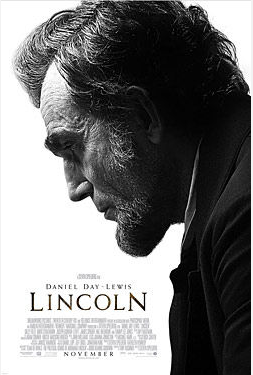
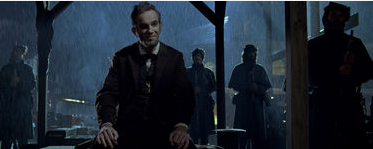 As a character study of a historical figure, Lincoln is a masterclass of filmmaking. It shows us a man who was smart, often quite witty, loved to share stories, and knew how to play dirty politics with the best of them. It shows a man driven to obtain the votes that he needs in order to abolish slavery, and even goes so far as to some under the table deals and bribes to get the votes that he needs. He seeks to end the war with the South on his own terms, when there is talk that the South might be willing to end the war if he plays by their terms. We witness all of this through surprisingly intense recreations of political talks and meetings. For Spielberg, this is a relatively small-scale movie. Aside from a battle scene which opens the film, there are no grand sequences. We are locked inside the rooms with these men as they determine the future of the country. It is a credit to Spielberg's direction that the film never feels claustrophobic, or dreary.
As a character study of a historical figure, Lincoln is a masterclass of filmmaking. It shows us a man who was smart, often quite witty, loved to share stories, and knew how to play dirty politics with the best of them. It shows a man driven to obtain the votes that he needs in order to abolish slavery, and even goes so far as to some under the table deals and bribes to get the votes that he needs. He seeks to end the war with the South on his own terms, when there is talk that the South might be willing to end the war if he plays by their terms. We witness all of this through surprisingly intense recreations of political talks and meetings. For Spielberg, this is a relatively small-scale movie. Aside from a battle scene which opens the film, there are no grand sequences. We are locked inside the rooms with these men as they determine the future of the country. It is a credit to Spielberg's direction that the film never feels claustrophobic, or dreary.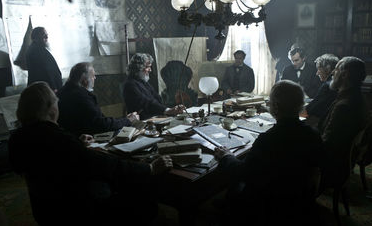 By now, you have probably heard much about Daniel Day-Lewis' portrayal of the President, and if I may be so blunt, his performance is one for the ages. It's the kind of acting that just makes you want to hand the guy the Oscar for Best Actor as soon as the movie's over. It is a completely transporting performance, so much so that you don't feel like you are watching an actor up on the screen. It is a somewhat different portrayal than what we are used to seeing (he does not have the booming voice, and he seems somewhat tired and defeated, but still confident), but it is no less stirring. It is truly a performance worth celebrating, and one that will not be forgotten once the nominations and awards are handed out. Day-Lewis is, in a simple word, sensational here.
By now, you have probably heard much about Daniel Day-Lewis' portrayal of the President, and if I may be so blunt, his performance is one for the ages. It's the kind of acting that just makes you want to hand the guy the Oscar for Best Actor as soon as the movie's over. It is a completely transporting performance, so much so that you don't feel like you are watching an actor up on the screen. It is a somewhat different portrayal than what we are used to seeing (he does not have the booming voice, and he seems somewhat tired and defeated, but still confident), but it is no less stirring. It is truly a performance worth celebrating, and one that will not be forgotten once the nominations and awards are handed out. Day-Lewis is, in a simple word, sensational here.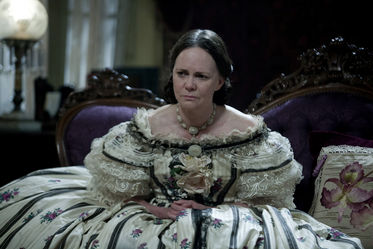 And yet, I would be remiss not to mention the supporting performances, which are surprisingly just as strong, and just as worthy of recognition. In particular, Joseph Gordon-Levitt (who is having the kind of year any actor could only dream of) as his adult son, Robert, and Sally Field as Lincoln's wife, Mary, deliver their best work of their careers in their subplot, which concerns Robert's desire to fight in the war, and Mary still holding remorse over the death of one of their children to an illness. Also worthy of recognition is Tommy Lee Jones, as the fiery congressman, Thaddeus Stevens. He gets some big laughs from the insults he hurls at his opponents at the House, but also delivers a surprisingly layered portrayal. Any of these performances would be worthy of award recognition, and I truly hope they are not forgotten after Day-Lewis' inevitable Best Actor nod.
And yet, I would be remiss not to mention the supporting performances, which are surprisingly just as strong, and just as worthy of recognition. In particular, Joseph Gordon-Levitt (who is having the kind of year any actor could only dream of) as his adult son, Robert, and Sally Field as Lincoln's wife, Mary, deliver their best work of their careers in their subplot, which concerns Robert's desire to fight in the war, and Mary still holding remorse over the death of one of their children to an illness. Also worthy of recognition is Tommy Lee Jones, as the fiery congressman, Thaddeus Stevens. He gets some big laughs from the insults he hurls at his opponents at the House, but also delivers a surprisingly layered portrayal. Any of these performances would be worthy of award recognition, and I truly hope they are not forgotten after Day-Lewis' inevitable Best Actor nod.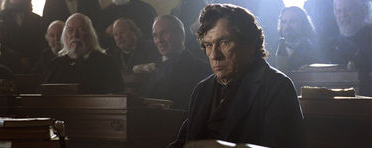 This is the rare historical epic that transported me to the time it was set in. I stopped looking for the recognizable actors, and just let the performances and the atmosphere of the 19th Century take over. Lincoln stands head and shoulders over most historical epics, because it does not feel the need to be a summary of the man's life. It simply takes us back to some of the most important and most crucial months in his term as President, and transports us. We are engaged as we watch the events unfold. Spielberg and Kushner have perfectly captured the feeling of the people of the time, and the time itself. It is an amazing feat. And despite a strong music score by John Williams, it is surprisingly seldom used. Spielberg lets the emotion of his scenes speak for themselves. And when he does use background music, it is used wisely.
This is the rare historical epic that transported me to the time it was set in. I stopped looking for the recognizable actors, and just let the performances and the atmosphere of the 19th Century take over. Lincoln stands head and shoulders over most historical epics, because it does not feel the need to be a summary of the man's life. It simply takes us back to some of the most important and most crucial months in his term as President, and transports us. We are engaged as we watch the events unfold. Spielberg and Kushner have perfectly captured the feeling of the people of the time, and the time itself. It is an amazing feat. And despite a strong music score by John Williams, it is surprisingly seldom used. Spielberg lets the emotion of his scenes speak for themselves. And when he does use background music, it is used wisely.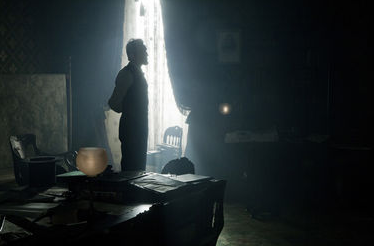
See the movie times in your area or buy the DVD at Amazon.com!






0 Comments:
Post a Comment
<< Home